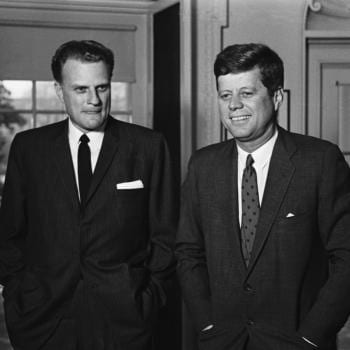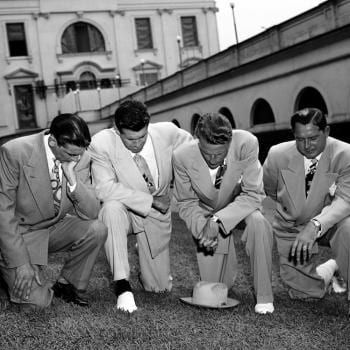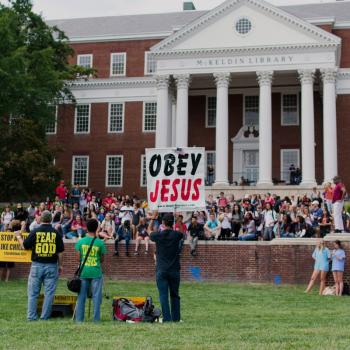Lydia Bean and Steven Teles are nostalgic for an evangelical constituency in which spokesmen and women actually represented the evangelical rank and file. Theirs is a mildly interesting story about the way that political progressives a decade ago courted born-again Protestants to join ranks with the environmentalist cause through the Evangelical Environmental Network (EEN).
To lay a foundation for the idea of climate care, the EEN targeted the National Association of Evangelicals (NAE), a historic fellowship that represented nearly 40 smaller evangelical denominations as well as many Christian schools and organizations and that had a long history of convening evangelicals as a united voice since its founding in 1942. The EEN also took aim at Christianity Today, the flagship national magazine for moderate evangelicals; national parachurch agencies like World Vision, the largest Christian relief and development organization in the world; and the Washington, D.C.-based Ethics and Religious Liberty Commission (ERLC), the policy arm of the Southern Baptist Convention, the largest evangelical denomination in the country. The ERLC had historically been a challenging target, because of its core role in the Republican Party and its tight focus on issues related to abortion, gender, and sexuality. Yet EEN leaders hoped to win the ERLC’s support for climate care, because even just neutralizing the Southern Baptist Convention in the debate on global warming could disrupt the solid Republican opposition to measures like cap-and-trade.
In 2006, with funding from the Hewlett and Energy Foundations, the EEN launched the Evangelical Climate Initiative (ECI), the culmination of its effort to encourage major evangelical institutions to develop a public witness on climate change. It convened a small group of evangelical allies to draft a founding statement for the ECI, titled “Climate Change: An Evangelical Call to Action.” Core leaders of the ECI began collecting signatures for this statement by sending out letters and holding meetings with senior evangelical leaders. Signatories included the board members of the NAE, presidents of universities in the Council of Christian Colleges and Universities, and executives of groups affiliated with the Association of Evangelical Relief and Development Organizations. Among evangelical pastors, prominent signatories included Leith Anderson, president of the NAE and pastor of the multi-campus Wooddale Church in Minnesota; Joel Hunter, pastor of a multi-site megachurch Northland in Florida; and Rick Warren, pastor of Saddleback Church in California and the author of the best-selling book The Purpose Driven Life. The ECI made a national media splash, magnified through advertising in print, radio, and television. The NAE’s Richard Cizik was even featured in the May 2006 “Green Issue” of Vanity Fair for his religious leadership on climate change.
And then Calvin Beisner happened:
The founder of the Interfaith Stewardship Alliance, Calvin Beisner, is a Christian theology professor who has monitored and critiqued the Christian left since the 1980s. In the early 1980s, Beisner became alarmed that left-leaning evangelical leaders like Jim Wallis and Ron Sider were “embracing a civil social order, a polity, a theory of economics and politics that the more I studied, the more convinced I became that that was not what best helped people rise out of poverty.” When Sider helped found the Evangelical Environmental Network in the early 1990s, Beisner became concerned that this movement might lead to greater government intervention in the economy. In 1997, Beisner published Where Garden Meets Wilderness: Evangelical Entry into the Environmental Debate, a critique of the Creation Care movement.
In 1999, Beisner was introduced to policy advocacy by Robert Sirico, founder of the Acton Institute, a conservative think tank dedicated to the intersection of faith and free-market principles. In 2000, the Acton Institute pulled together 1,500 signatories for a statement called the Cornwall Declaration on Environmental Stewardship, signed by prominent Christian right leaders like Charles Colson, James Dobson, Richard John Neuhaus, and D. James Kennedy. The Cornwall Declaration stated that human beings should exercise dominion over the earth and that free markets were the best engine of ecological stewardship. In fall 2005, Beisner launched another loose network of conservative intellectuals opposing environmentalism, with help from the Committee For A Constructive Tomorrow, a right-wing policy group founded in 1985 to oppose environmentalism. This new project was the Interfaith Stewardship Alliance, but was soon rebranded as the Cornwall Alliance and positioned as the institutional hub for coordination among economic conservatives, climate-change skeptics, and evangelicals.
Bean and Teles then explain the lesson this tale yields:
The Evangelical Climate Initiative crumbled quickly in the face of this opposition because it lacked mobilized power—a base of supporters with intense policy demands willing to engage in conflict with organized opposition. Instead, the Creation Care movement had built only convening power—the ability to bring disparate people together through identity and networks. The collapse of the ECI shows the limits of convening power in the face of organized opposition.
All I could think about while reading this piece was how once upon a time evangelical spokespeople, political activists, journalists, and academics assumed that American evangelicals were a coherent piece of the patchwork of American politics. It had leaders, gatekeepers, and members with shared convictions. Bean and Teles still write in Spring 2016 as if those realities exist.
But Donald Trump revealed how vastly observers of evangelicalism, its leaders, and members overestimated that evangelicalism had a there there. As we are now apparently learning, evangelicals differ significantly about campaign issues like immigration and abortion. Evangelical leaders are no way near representative of the evangelicals in the pews (or the ones who worship at Bedside Baptist with Pastor Pillow). And even worse, evangelicalism as a descriptor of the American electorate is virtually worthless (and that hurts because of all the research money from foundations poured into the study of evangelicals and American politics).
In other words, if we knew in 2000 what we now know thanks to Donald Trump, wouldn’t the Evangelical Climate Initiative, Calvin Beisner, and Fox News look like cats when they play with their tails?












